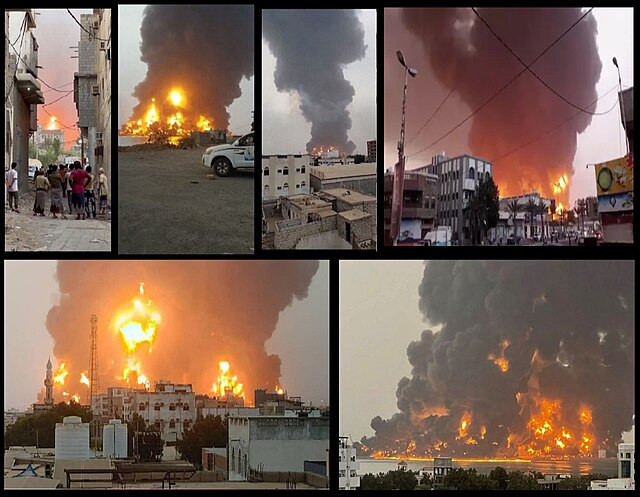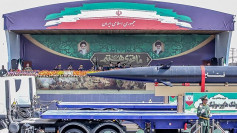Israel launched airstrikes on Houthi targets in Yemen on Saturday, following a deadly drone attack in Tel Aviv claimed by the Iran-backed Houthi movement. The airstrikes reportedly hit storage facilities for oil and diesel at a port in Hodeidah, causing substantial damage and casualties.
According to Al-Masirah TV, controlled by the Houthi movement, the airstrikes also targeted a local electricity company, resulting in widespread power outages. Health officials in Yemen confirmed multiple deaths and injuries but did not provide specific numbers. The strikes ignited a large fire at the port, exacerbating the chaos.
The Israeli military stated that its fighter jets targeted military assets of the Houthis in the Al Hudaydah Port area in retaliation for the recent drone attack on Tel Aviv, which killed at least one person and injured eight others. "The strikes were in response to the hundreds of attacks carried out against the State of Israel in recent months," the military said.
A U.S. official confirmed to CBS News that Israel conducted the airstrikes independently, with no involvement from the United States. Houthi spokesman Mohammed Abdulsalam condemned the Israeli actions, describing them as a "blatant Israeli aggression" aimed at increasing the suffering of the Yemeni people and pressuring Yemen to stop supporting Gaza.
The Houthi rebels have been embroiled in a decade-long civil war against Yemen's internationally recognized government. They have also launched numerous attacks on Israeli targets and commercial vessels in the Red Sea, in solidarity with Hamas. The Houthis claim their latest strike on Tel Aviv marks a "new phase" in their operations against Israel.
Israeli Prime Minister Benjamin Netanyahu defended the airstrikes, asserting that the port targeted was used for military purposes and as an entry point for weapons supplied by Iran to the Houthis. "I have a message for Israel's enemies: don't get us wrong, we will protect ourselves in every way, on every front. Anyone who harms us will pay a very heavy price for his aggression," Netanyahu said.
Israeli Defense Minister Yoav Gallant emphasized the seriousness of the retaliation, noting that this was the first instance where the Houthis had directly harmed an Israeli citizen. "The blood of Israeli citizens has a price. This has been made clear in Lebanon, in Gaza, in Yemen, and in other places - if they dare to attack us, the result will be identical," Gallant stated.
The drone attack in Tel Aviv caused a large explosion early Friday morning, shattering windows and spreading shrapnel. Houthi rebels claimed responsibility, boasting that the attack showcased a new drone capable of bypassing enemy interception systems. However, U.S. officials believe the drone used was an existing model with a modified fuel tank to extend its range.
The explosion occurred near the U.S. consulate in Tel Aviv, but no American casualties were reported. The incident has heightened security concerns and underscored the Houthis' expanding reach and capabilities.
Since January, U.S. and British forces have been conducting airstrikes in Yemen in response to Houthi attacks on commercial shipping. These strikes have had limited success in deterring the Houthis, who continue to launch drones and missiles at Israeli and Western targets.
Israeli officials have decided to take a more direct approach, with Defense Minister Gallant informing U.S. Secretary of Defense Lloyd Austin of the airstrikes in advance. Gallant stated that the swift response was possible due to months of preparation for such a scenario.
The airstrikes have drawn condemnation from various quarters, including Hezbollah in Lebanon and Hamas, both of which have expressed solidarity with the Houthis. Iran, through its Ministry of Foreign Affairs spokesperson Nasser Kanaani, condemned the Israeli action, warning that it risks igniting a broader conflict in the region.






